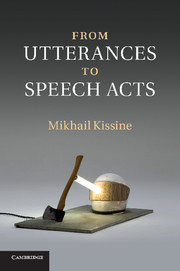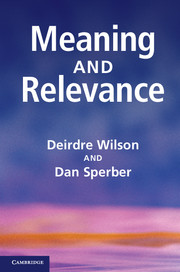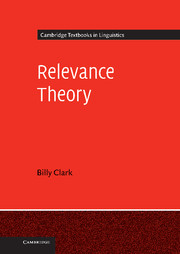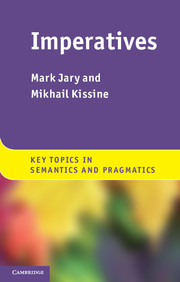From Utterances to Speech Acts
Most of the time our utterances are automatically interpreted as speech acts: as assertions, conjectures and testimonies; as orders, requests and pleas; as threats, offers and promises. Surprisingly, the cognitive correlates of this essential component of human communication have received little attention. This book fills the gap by providing a model of the psychological processes involved in interpreting and understanding speech acts. The theory is framed in naturalistic terms and is supported by data on language development and on autism spectrum disorders. Mikhail Kissine does not presuppose any specific background and addresses a crucial pragmatic phenomenon from an interdisciplinary perspective. This is a valuable resource for academic researchers and graduate and undergraduate students in pragmatics, semantics, cognitive linguistics, psycholinguistics and philosophy of language.
- Addresses a crucial pragmatic phenomenon from an interdisciplinary perspective, which will appeal to linguists, philosophers, psychologists and cognitive scientists
- Avoids formalism and theory-specific terminology and does not presuppose any specific background
- Accessible to a wide range of scholars and suitable for advanced undergraduates and graduate students
Reviews & endorsements
'Mikhail Kissine provides a most comprehensive and compelling case for the study of literal and nonliteral speech acts within a rigorously naturalistic approach. His data and arguments, which challenge theoretical confusions and prevalent assumptions, make up a major breakthrough. From Utterances to Speech Acts is an engaging read, novel and eye-opening - a lucid, evidence-based model of the study of direct and indirect language use among typically and atypically developing individuals.' Rachel Giora, Tel Aviv University
'Kissine offers a new theory of speech acts which is philosophically sophisticated and builds on work in cognitive science, formal semantics, and linguistic typology. This highly readable, brilliant essay is a major contribution to the field.' François Recanati, Institut Jean-Nicod
'… an original, informed and compelling new contribution to the literature on the nature of speech acts. Kissine provides good reasons to put aside widely accepted Gricean accounts in terms of complex intentions, in part based on up-to-date empirical data. He provides an alternative account, on which speech acts constitutively express reasons (to believe or to act), and develops detailed illustrative accounts of constative, directive and commissive speech acts - paradigmatically including, respectively, assertions, orders and promises. Kissine convincingly argues that his account is compatible with the empirical results that prove problematic for Gricean views, and in general with a naturalistic stance … includes many original conceptual proposals … Many of the book's proposals deserve to be taken up and examined further much more in depth by interested researchers. I believe the book will thus deeply influence the course of forthcoming research on its topics.' Manuel García-Carpintero, LOGOS, University of Barcelona
Product details
August 2014Paperback
9781107439665
210 pages
229 × 152 × 11 mm
0.29kg
3 b/w illus.
Available
Table of Contents
- Introduction
- 1. Austin's distinctions revisited
- 2. Intentional states and locutionary acts
- 3. Constative speech acts
- 4. Directive speech acts
- 5. Speech acts, autism spectrum disorders and typical development
- 6. Commissive speech acts
- Conclusion.





